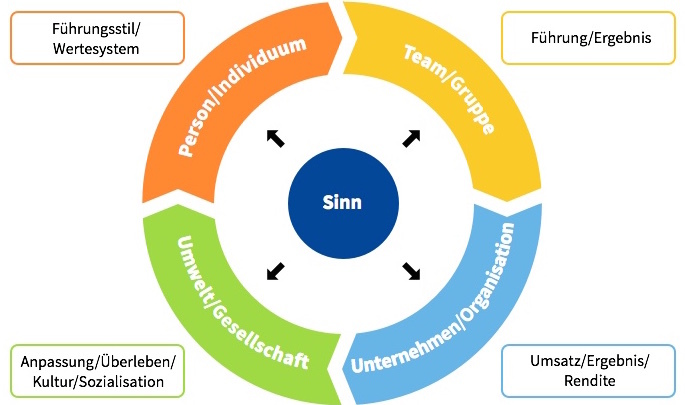Our basic understanding
"To lead is to create a world to which other people would like to belong."
(Daniel F. Pinnow, 2002)
The systemic Approach
The term "system" comes from the Greek and means a composite of several parts whole. "The whole is therefore more than the sum of its parts" (Aristotle).
Detached from classical system theory, "systemic" means thinking in terms of contexts. It means to look at without judging. And it means asking questions and not having ready answers.
The systemic view extends the focus from the person or the problem to the whole context and focuses less on individual sizes and more on what happens between the individual sizes or actors. Through systematic, systematic questions and attentive listening and observing, one can read the inner map of a person or an entire organization. Because the solution of the problem lies in the system itself and can only be found by itself. The systemic approach thus offers "help for self-help".
Systemic Leadership
 Dominant or authoritarian leadership is less and less. Word has gotten around that the success of corporate and human leadership does not depend solely on goals, strategies, structures, processes, job descriptions, and command of leadership tools. Intangible factors such as knowledge, competencies, relationships, feelings or brand values are just as crucial to staying in business.
Dominant or authoritarian leadership is less and less. Word has gotten around that the success of corporate and human leadership does not depend solely on goals, strategies, structures, processes, job descriptions, and command of leadership tools. Intangible factors such as knowledge, competencies, relationships, feelings or brand values are just as crucial to staying in business.
How can an executive optimally integrate all factual and personal relationships? How can it make a difference and practice both appreciation and value? How can she keep her goals in mind while remaining flexible? The answer to the challenges and developments of the 21st century is systemic leadership. Only in this way does an executive keep an eye on all essential dependencies and relationships.
Because: A leader must be able to lead himself, others, the business and the environment. Leadership thus always takes place in the field of tension of the four poles or levels of interaction: the personality of the manager (the "me"), the employees or the team, the organization and the environment. These four poles provide the framework for the artwork of successful leadership.
Knowing yourself or self-guidance
First of all, a leader must be in harmony with himself, i. to be in touch with oneself and to develop a self-awareness out of it. On the basis of an attentive self-perception, self-reflection, self-criticism and self-control as well as an authentic appearance, the manager in the next step can change others (employees, colleagues, supervisors, customers, partners, etc.) and the relevant overall system (team, company, project, etc.). " touch and lead
Feedback plays a key role as a method: The leader must be able to obtain feedback on his own behavior and to deal with it. D. H. it has to be open to other ideas, perspectives and points of view. Feedback is not a one-way process that runs from the leader to the employees.
The staff or his team lead
To be a systemic person means to lead an individual, to have your own flexible style and to be able to adapt it to the circumstances, the organization and the people you are leading, instead of working only schematically with standardized tools. It also requires accepting the indeterminacy and uncertainty inherent in complex systems. Therefore, good intuition and a degree of risk-taking are important traits of systemic leaders.
In addition to the classic requirements for an executive, to give an orientation for his company or his employees as well as to make the necessary and relevant decisions, so that the corporate, division or team goal can be achieved, it is mainly aspects of "personal attitude". that form the basis of Systemic Leadership:
- Inner conviction
- self reflection
- interpersonal skills
- Appreciation
- resource orientation
These values should be experienced by the executive, made transparent and discussed. Only honest and consistent "value and relationship management" on a systemic basis makes it possible to fully exploit the employee potential and avoid demotivation. To do this, the leader needs to know himself and to get to know him better, also with regard to his own biography and socialization.
Lead the organization
Systemic leaders know that human actions and decisions run unconsciously and emotionally and often, if at all, can only be controlled indirectly. At the same time, they look at factual, temporal and social connections and distinguish between self and other images as well as single and total observations. Such leaders must be able to handle power and influence structures, group dynamics, feelings, relationships, individual needs, organizational constraints, beliefs, values, and cultures very well, without neglecting traditional management tasks such as goal setting, delegation, or control.
Lead in the enviroment
An executive bears responsibility for the impact of their actions on society and the environment and promotes sustainable action.











